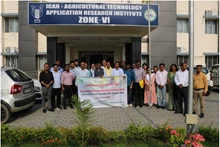
Organic food is cultivated without synthetic chemicals like pesticides and fertilizers, and it does not contain GMOs. The distinction lies in its production methods, which prioritize sustainability and environmental balance.
Health and Nutritional Benefits
Organic farming practices contribute to resource cycling, ecological balance, and biodiversity conservation. Numerous studies indicate that organic varieties boast higher levels of antioxidants, vitamins, and minerals compared to their conventional counterparts. With organic, you're not just nourishing your body; you're also supporting a healthier planet.
Identifying Organic Food
-
Size, Shape, and Appearance: Organic foods exhibit natural variations in size, shape, and appearance. Unlike their mass-produced counterparts, they are not uniform in size or artificially enhanced.
-
Shorter Shelf-Life and Preservative-Free: Organic foods have a shorter shelf life due to the absence of artificial preservatives.
-
Food Smell or Aroma: Organic foods usually have a distinct aroma and flavor, indicative of their natural processing.
Certification and Standards
Organic food products undergo rigorous certification processes to ensure compliance with organic farming standards. In India, certification systems like the Participatory Guarantee System (PGS) and the National Program for Organic Production (NPOP) uphold the integrity of organic labeling, safeguarding consumer trust and transparency.
Why Go for Organic
-
Healthier Choices: By switching to organic, you prioritize your health and well-being by reducing exposure to harmful chemicals and pesticides.
-
Environmental Sustainability: Organic farming practices promote soil health, water conservation, and biodiversity preservation, contributing to a more sustainable food system.
-
Supporting Local Farmers: Choosing organic supports local farmers and communities committed to ethical and sustainable agricultural practices.
In a landscape inundated with food choices, understanding how to identify organic products empowers consumers to make informed decisions that are beneficial to their health, and increase environmental consciousness.










